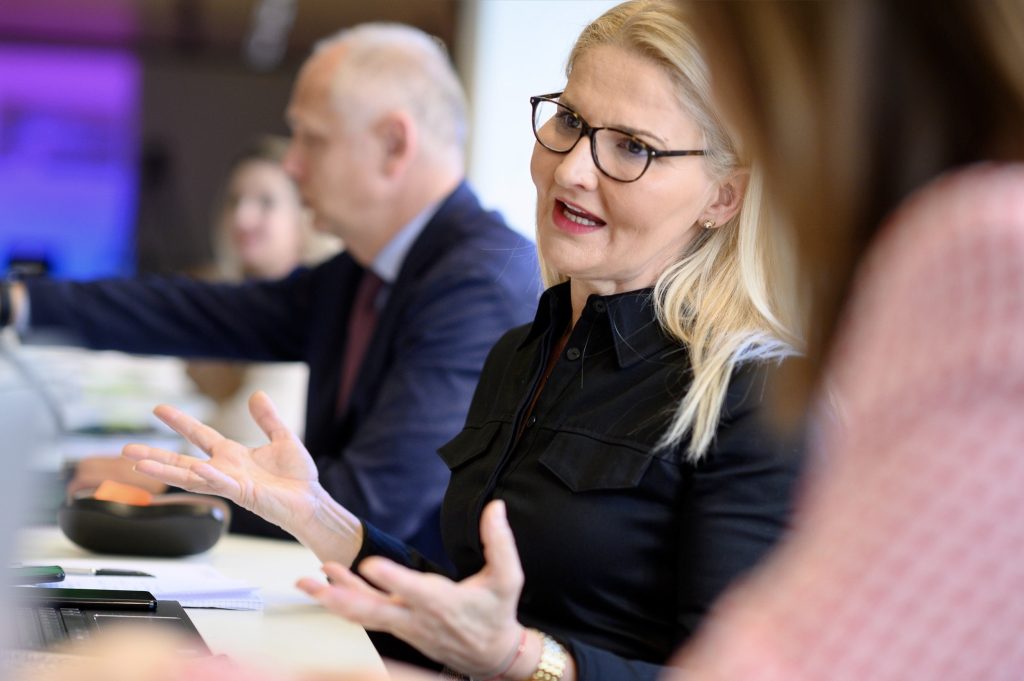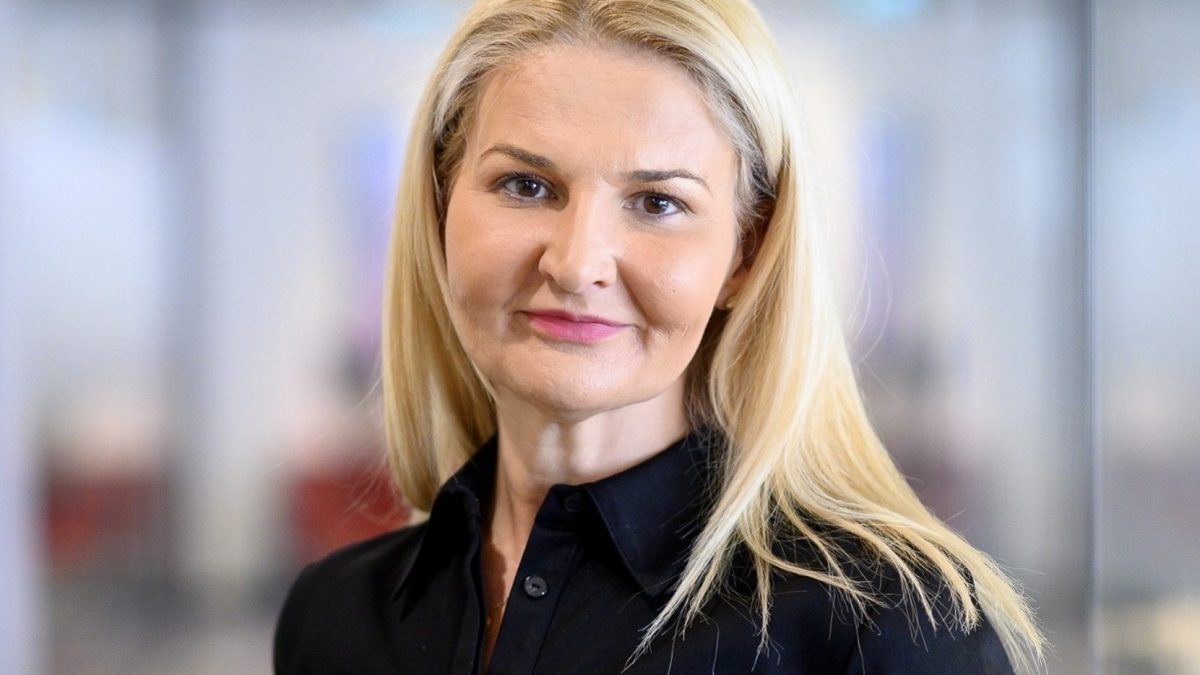Can the Western Balkans be an Example of a Green Transition?
In 2019, 30,760 premature deaths were recorded in the Balkans region due to air pollution alone. Due to the poor condition of the water supply network, we lose 50 percent of drinking water. If this is not alarming and frightening for all of us, I don’t know what is, Tanja Miščević, the Deputy Secretary-General and Head of the Program Department of the Regional Cooperation Council, stresses in an interview with Mikser Association.
Do the citizens of Serbia and the region know what the Green Agenda for the Western Balkans means and carries along? What do we need to change in the ways we produce, trade, and spend, to reach its standards within the given deadline? And why it is important to do so!
The Deputy Secretary-General and Head of the Program Department of the Regional Cooperation Council, Tanja Mišćcević, explains that the need for green transformation in the Balkans is not just a matter of economics but rather a social issue.
Above all, it is a burning issue of health and quality of life of citizens. The pandemics disrupted supply chains and skyrocketed the prices of natural resources, and the situation will only get more complicated, having in mind the current situation in Europe – says Miščević.

Please explain the role of RCC in the Western Balkans in the context of the European Green Deal implementation
The role of RCC is multifold in this context. Firstly, we coordinated the development of the Green Agenda for the Western Balkans (GAWB), which the governments adopted two years ago, and subsequently of the Action Plan for implementation of this ambitious agenda covering the period by 2030. Within its mandate, RCC is currently supporting the swift implementation of this Plan at the regional level through the progress monitoring and reporting mechanism.
The Green Agenda for the Western Balkans resulted from the need to respond to the environmental protection challenges the region is facing and to align our policies with the key long-term priorities of the European Union (EU) defined through the European Green Deal (EGD).
The goal of EGD is for Europe to become a carbon-neutral continent by 2050 – that is to remove all greenhouse gasses from the atmosphere up to that time. In order to attain this very ambitious goal, comprehensive structural changes are planned in the production and consumption patterns to reduce greenhouse gas emissions in particular and protect the environment in the broader context. In fact, there will be no room for carbon-intensive products or those with potential other detrimental environmental impacts in the EU market in the future. Funds for financing green projects are ever more available and affordable while it is getting increasingly difficult to find funding for brownfield projects. We have to take account of all this as over 70% of total regional export is focused on the EU market which is also where most of the FDI is coming from the region.
How is this document incorporated into the ‘Sofia agreement’ and what does it mean for the region and Serbia? What commitments have signatories entered into by this agreement?
Six leaders from the region endorsed the Declaration on the Green Agenda for the Western Balkans at the Sofia Summit in 2020. Green Agenda entails the following: achieving carbon neutrality by 2050; improving environmental protection, nature conservation, and biodiversity in the region; reducing pollution, and introducing a circular economy and environmentally sustainable agriculture. The economies in the region committed to aligning their mid-term emission reduction plans (by 2030) with the EU’s ambitions on reducing CO2 emissions.
The Action Plan for the Implementation of the Green Agenda includes carbon tax measures, plans for carbon-free electricity production, more efficient pollution control, nature, and biodiversity protection, and provides an indicative timeline for harmonization with the EU’s Emission Trading System (ETS) by 2024.
For the entire region, and thus for Serbia too, the need for green transformation is not just an economic issue but also an important social issue, in particular, that of health and quality of life of its citizens. This transition comes after the crisis caused by the pandemic and disrupted supply chains, including a surge in natural resource prices, energy prices in particular, and will become even more complex having in mind the current situation in Europe.
The green transformation of our region will not be an easy one. The CO2 emission per unit of GDP is higher than the EU average in all economies of the Western Balkans, except Albania. Around 83% of gross available energy in the Western Balkans comes from fossil fuels compared to 70% in the EU.
However, the green transition presents a number of opportunities to increase economic competitiveness, attract clean and advanced technology investments, improve air quality, river protection, and overall quality of life of its citizens, especially in vulnerable categories such are women, youth, and Roma people. Green transition offers substantial opportunities for the Western Balkans, including deeper integration into the Eurocentric value chains and access to a significant volume of EU resources to fund the green transition.
What is Serbia’s position relative to the neighboring countries that are the EU Member States, such as Croatia, Slovenia, or Bulgaria?
The circumstances and starting positions of each of these EU MS are different. However, the fact is that they too face certain delays in adopting their climate policies, primarily caused by the coronavirus crisis in some of these countries.
However, European Green Deal is the EU’s long-term umbrella development strategy whose goals and elements the EU made mandatory for all EU MS and translated into a number of binding legal acts. By all means, the EU provided a number of support mechanisms for attaining those goals. On the other hand, GAWB is a declaration that secured political support to this concept. Yet, it is only through the implementation of the Action Plan that this demonstrated political will is to be translated into a set of specific actions and programs to attain the defined goals.
It is clear that the starting positions of the EU MS and we in the Western Balkans are different. Still, I think that at this moment we do not lag too much behind the new MS as they too are in the initial phases of implementation of the commitments undertaken, given that the pandemic took its toll and slowed down the implementation of the Green Deal in the EU too.
Still, GAWB comes under the same law that all other reform processes in the region were under – we must run much faster to catch up with our neighbors from the EU, and there is no denying it.

We are far from the energy efficiency of the developed parts of Europe. When referring to getting closer to this goal, in your opinion which path is better: ‘quantum leap’ or ‘boiling frog’? What are the strengths and weaknesses of both approaches?
Energy intensity provides us the information on the amount of energy needed to produce a unit of GDP. This indicator monitors the trend of decoupling economic growth from total energy consumption. In other words, the aim is to use energy as rationally as possible and generate economic growth while at the same time protecting the environment. Energy intensity in Serbia is 2 to 3 times higher than in neighboring EU MS and 4 to 5 times higher relative to the old EU MS.
Improvement in energy intensity is a major growth opportunity for the entire region which may drive investment cycles into renewable energy sources, sustainable mobility, industry modernization, building renovation on a massive scale, and improving the quality and sustainability of agriculture and food. The accelerated transition of key sectors contributing most to greenhouse gas emissions is the right way forward, while carefully recognizing new opportunities for government, companies, and citizens brought about by the green transition. Likewise, it is necessary to manage transition risks wisely and ensure that it is sustainable, just, and adequately financially supported. It is necessary to always be mindful that those who do not adapt will lag far behind.
How do you see the role of media in communicating such topics to the public in Serbia and the region? RCC has developed communication channels with decision-makers, but how do you reach out to the general public?
The role of media in all issues of public interest, and the Green Agenda is certainly at the top of priorities of public interest, for each citizen of this region and for their political leaders alike.
According to Balkan Barometer, a public and business opinion survey the RCC is conducting every year, 74% of WB citizens consider climate changes a problem, as well as growing pollution in the region (73%). On the other hand, 29% of them believe that much knowledge and money are needed to reduce CO2 emissions and bring them close to zero which will enable reaching the region’s climate neutrality by 2050. While 32% of respondents believe this will be difficult to reach, only 22% see it as a necessity.
You see, there are no quick or easy solutions. Much like in real life. Nothing can be solved overnight. It is particularly difficult when we need to divert from our routine and bring changes in any aspect of our life – even when we are absolutely sure that the changes are for the better and that they will enhance the quality of our life. It is still difficult. And especially if we know that the change will be costly and painful.
Yet, in the case of the Green Agenda, the change of application, whichever you like, is very much needed, not to say vital. The change is coming, whether we want it or not. Green Agenda is a way to try to control these changes so they come under our terms and as we have set it out, at a pace we can keep up with, pay for and adapt. And we cannot wait any longer.
In 2019 the region recorded 30.760 premature deaths solely due to air pollution. Moreover, it is estimated that the annual precipitation amounts in the Balkans will reduce by 40% with an alarming increase in temperature of 1.2ºC and that the warming will continue further throughout this century. An increase in temperature, drought, and extreme weather phenomena will have a negative impact on biodiversity in the region. Western Balkans may have abundant water, but the region is still unprepared for climate changes – and is threatened by droughts and floods, including a lack of potable water in some areas. For example, we lose 50% of potable water due to the poor state of the water supply system. If this is not alarming and terrifying for all of us then I do not know what is.
Therefore, the media have to have a key role in raising awareness of the importance of Green Agenda implementation. Aware and informed citizens are the additional impulses for governments to accelerate the implementation of plans and strategies. According to Balkan Barometer, 45% of Western Balkans citizens believe that media can efficiently scrutinize the work of governments and make it more effective.
What are the far results of the engagement of countries/ministries and where do you see room for improvement?
The very endorsement of the GAWB and the Action Plan for its implementation represents considerable progress in the approximation of the Western Balkans with the EU strategic commitment in this area. A great job has been done considering the crisis and adverse environment. With regards to the Plan implementation, which falls under the competence of executive authorities of each economy, there are visible, however uneven, signs of progress in some areas. Hence, there is always room for improvement, and everywhere.
When it comes to the RCC activities, over the next period we plan to establish mechanisms that will enable more efficient coordination of the first phase of Plan implementation at the regional level, including engagement of wider civil society, the business community, local communities, financial institutions, etc. in regional dialogue about green transformation.
Which WB countries that signed the “Sofia agreement” are “good students” of EU’s Green Deal and is political will the most important parameter which green transition dynamics depend on?
The next important challenge for economies from the region is defining objectives within the energy plans and climate objectives by 2030 which should be in line with the EU ambitions in this context. It is no easy job taking into account the current crisis in supply, availability, and high prices of energy. Perhaps it is an opportunity to recognize those ‘successful students in the region’. Not to praise them but for all of us to learn from good examples – there is no competition in green transition as the air will be clean in the region only when all economies are successful in attaining the Green Agenda objectives.
The green transition will be different for different economies in the region, and in particular, demanding for Serbia and Bosnia and Herzegovina which contribute around 80% of emissions in the region. Carbon intensity per unit of GDP PPP of both is around four times higher than the EU average. If comparable data were available for Kosovo[*], there would surely be an even bigger carbon intensity. On the other hand, per capita emissions of Albania, Montenegro, and North Macedonia are lower than the EU average and slightly higher per unit of GDP PPP. According to the World Bank data, the industry of Serbia and Bosnia and Herzegovina has sound potential for the production of some green technologies and medium complexity products. The entire region has untapped potential for development of innovation and it is something that should be developed in line with the Green Agenda plans.
To conclude, political will is important but certainly not the only parameter on which green transition dynamics depend on. Brown industries do, however, have a long tradition, they are a substantial source of employment in the region, with developed value chains and markets. The costs of transition are considerable, and green transition must be fair and just towards all individuals and parts of the region. The EU provides considerable support through its Economic and Investment Plan, with funds available for these purposes as well. In addition, all other opportunities related to the development or application of green technologies and investments, creating green jobs, and greening certain sectors, from industry and energy to education, transport, agriculture, building construction, etc. should be seized. In addition to political will, it is necessary to raise awareness of citizens and companies on the benefits of green transition, strengthen implementation capacities, and secure adequate funds.
Finally, we have to be aware, each and every one of us, that we are all part of the green transformation and that each and every one of us has a role to play. The sooner we realize this and begin working to provide our contribution, the easier and faster the change will be, and the quality of life considerably better. As the saying goes ‘You can’t finish what you don’t start. So, let us start. Together.
author: A. Malušev
[*] This designation is without prejudice to positions on status, and is in line with UNSCR 1244/1999 and the ICJ Opinion on the Kosovo declaration of independence.

